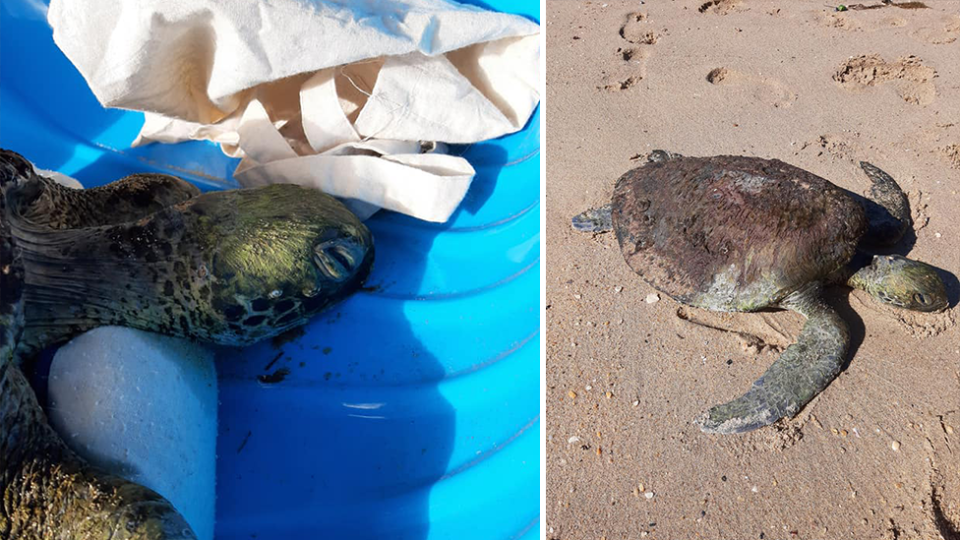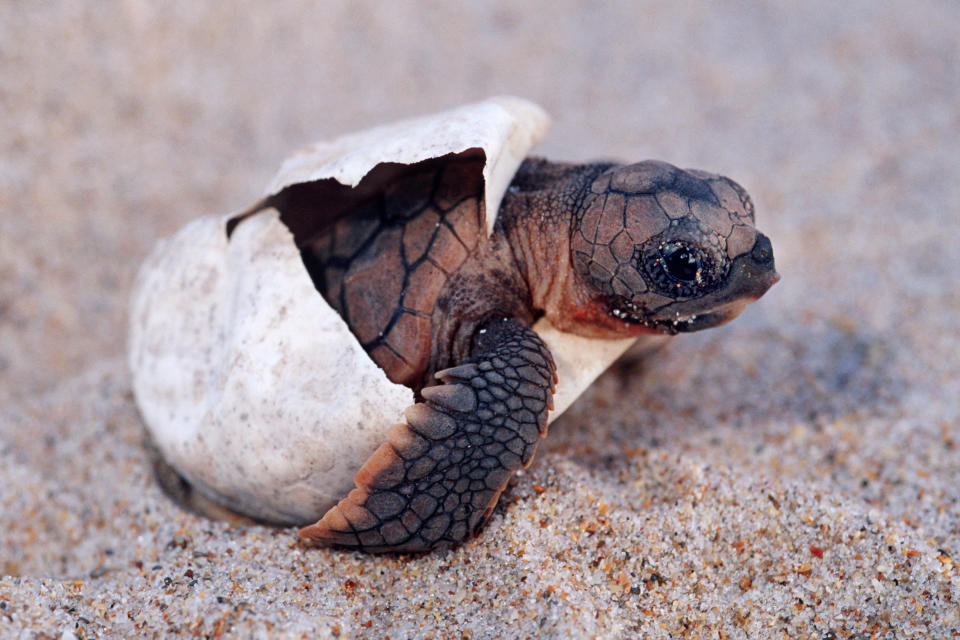'Had to do something': Sad theory after man finds 20 dead turtles on beach
When turtles started washing up on a Queensland man’s doorstep, he made it his mission to help the endangered animals and find out why.
In just two years, 20 of the reptiles have washed up dead on the beach outside 68-year-old Geoffrey Redman’s Margate home, 26km north of Brisbane.
Most of them were endangered green sea turtles.
“I live 30 metres from the water and I kept finding dead turtles out the front of my place on the beach,” Mr Redman told Yahoo News Australia.
“I thought I’ve got to do something about it.”

All of the world’s seven species of marine turtle are now considered rare or threatened, with commercial fishing, plastic, agricultural run-off and climate change all impacting on numbers.
In the hands of a qualified turtle rescuer like Mr Redman, even dead specimens found washed up on the beach can be used to help with conservation.
When he gets a call to investigate a body, he grades the remains on a scale of one to six and reports his findings to authorities.
Only those deemed to be a one or two will be sent on for necropsy, and help determine the animal’s cause of death and better understand factors causing mortality.
Race against time to understand turtle deaths
Moreton Bay’s humid temperatures mean it’s a race against time to get the turtles to a vet to be analysed for cause of death.
“Someone sent me a photograph of a turtle, and the next day I went to it and its insides were on the outside,” Mr Redman said.
“After 24 hours in the sun a turtle will be a stage three.
“In one day of death they change that much and they’ve got to be ‘as fresh as a daisy’ to do a necropsy.”

A critically-endangered hawksbill turtle Mr Redman found on Saturday was too far gone to determine its cause of death.
The small animal’s shell was severely cracked and the flesh had been eaten away from its face, exposing the skull.
Footprints in the sand indicate many beachgoers had walked by the animal before it was reported.
Commercial fishing the biggest threat to global turtle numbers
While the commercial harvesting of sea turtles for soup in Moreton Bay ended in 1950, globally commercial fishing remains the biggest threat to marine turtles.
Poaching of adults, along with accidental capture by fisheries has the “biggest and most direct effect”, according to Monash University’s Associate Professor Richard Reina.
“In Australia there is not the same sort of fisheries pressure that there is in other parts of the world where animals are caught for consumption, or most commonly caught accidentally as bycatch in commercial fisheries,” he told Yahoo News Australia.
“There are certainly greater beach protections in Australia than there are in other parts of the world.”
Most species of marine turtles migrate across the world’s waters, sometimes thousands of kilometres, meaning that what happens in the waters off foreign nations will affect Australian populations.

‘Not something that any single country can resolve’
Another key strain on turtle numbers is man-made climate change, which is affecting food supplies and leading to a drop in animal health.
“In general, warm water is less productive than cool water, so that means overall food webs become less productive,” Assoc Prof Reina said.
“As a consumer within that food web, sea turtles are potentially affected in terms of having less energy available to them and having less quality food.”
Even before they are born, turtles can be affected by increasing sand temperatures which influence gender selection and hatching success.

'Game is over': Extinction fears for species living in tiny stretch of Aussie river
'Shredded': Call for rethink of barbed wire fencing after horrendous deaths
The surprising items found in huge rubbish haul from Great Barrier Reef
“Because turtle sex is determined by the temperature at which they incubate, as temperatures get warmer, there are more and more females produced,” Assoc Prof Reina said.
“We also see the situation where nest temperatures become so high that the eggs all die and that’s more likely to be a problem than changes in sex ratios.
“With catastrophic embryo mortality, reproductive output gets much, much less.
“That’s not something that any single country can resolve.”
People who find a dead or injured turtle in Queensland can report it to the department of environment marine hotline on 1300 130 372 or wildlife.operations@des.qld.gov.au.
Do you have a story tip? Email: newsroomau@yahoonews.com.
You can also follow us on Facebook, Instagram and Twitter and download the Yahoo News app from the App Store or Google Play.




